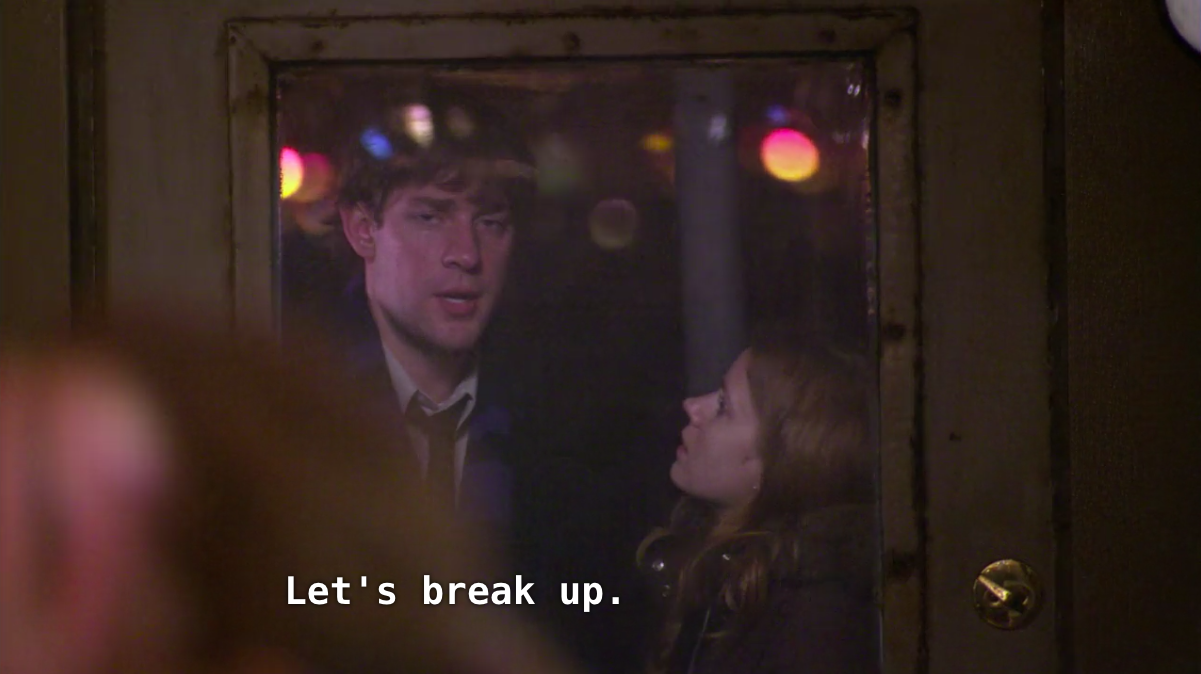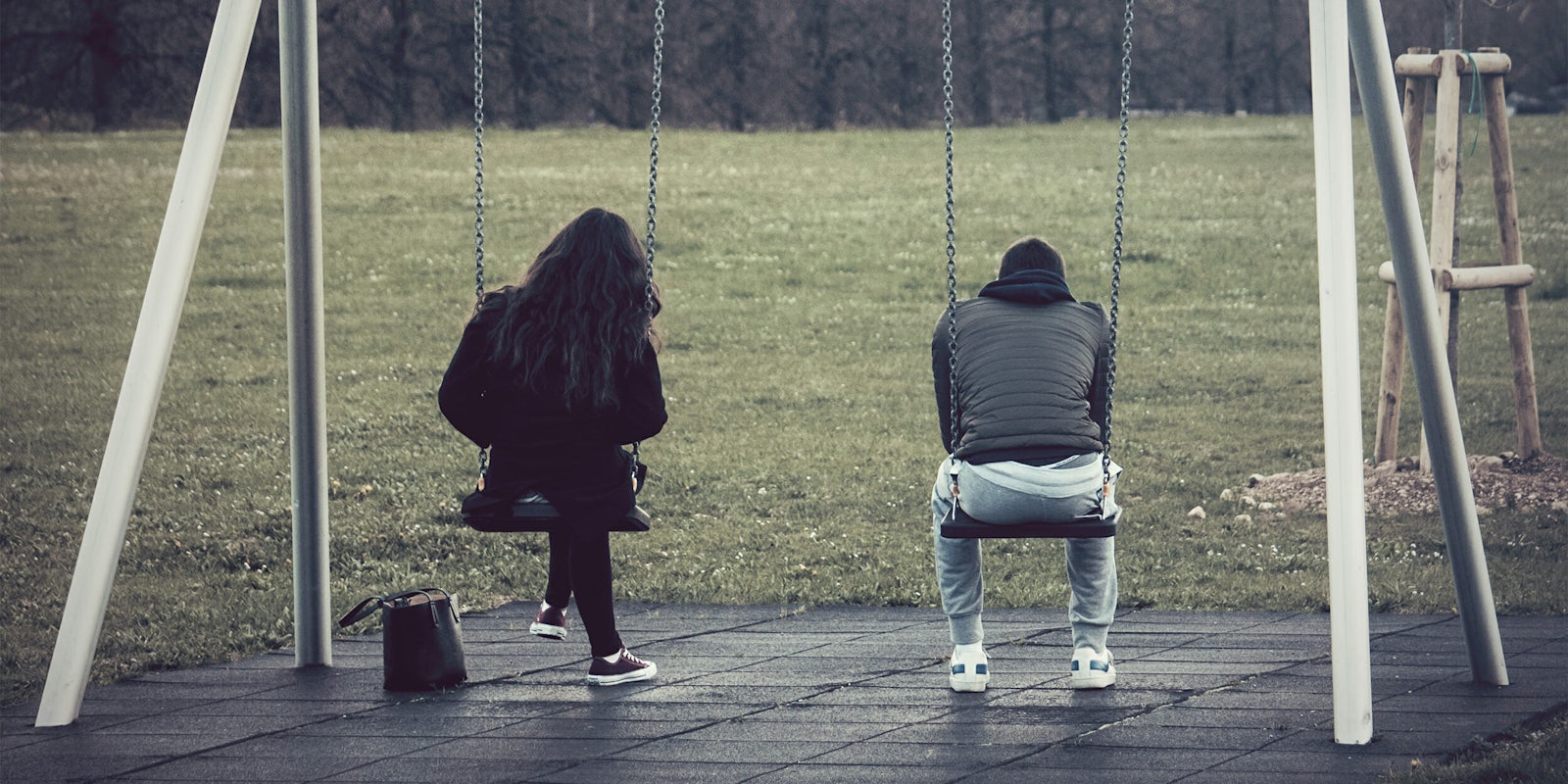As the song goes, breakin’ up is hard to do. Maybe you’re a partner hanging on for dear life wondering how to know when a relationship is over. Or maybe you’re the one who feels like the relationship has run its course. Either way, reaching that agreement is no simple feat.
I can still detail my first truly terrible breakup. I was a few days shy of starting my freshman year of college when my then-boyfriend texted me, innocuously, asking if we could talk. And I took it far from well—within 24 hours, I found myself serving beer to a throng of upperclassmen at an off-campus party, drinking away my own heartbreak as my high school friends metaphorically dumped on the wilting rose of my first Real™ relationship.
At the time, I said that I didn’t see the breakup coming and had been blindsided by his decision after nearly two years of dating. Months later, however, I’d replay the moments leading up to the breakup, plucking red flags from my psyche—even the ones I had raised myself.
Odds are, you may have felt (or currently feel) the same way. So, we asked for expert relationship tips that will help you know when your relationship is over. The Daily Dot spoke with Cyndi Darnell, an internationally renowned sex and relationship therapist, and John Daly, an interpersonal communications expert and communications studies professor at the University of Texas at Austin.
How to know when a relationship is over
1) There is no hard and fast sign indicating that a relationship is over
We’ll start by saying that there is not a catch-all sign that tells you, point blank, that a relationship is over. As Darnell puts it, “life is not a series of soundbites.” Daly, too, says that prescriptiveness about relationships doesn’t work, and each couple is different.
“We cannot say, categorically, these are the things that mean a relationship is good, and these are the things that mean a relationship is bad,” Darnell says. “Life is really damn complex.”

READ MORE:
- How to make long-distance relationships work
- 4 ways to get out of a toxic relationship
- The no-jerk guide to breaking up with someone
- How to get over a breakup like a boss
2) One person in the relationship is totally checked out
Darnell says less-invested partners aren’t paying attention. You might notice they’re spending more time answering emails or perusing Facebook. Maybe you realize that you haven’t gone on a date in a while. And this doesn’t necessarily mean a date where you spend money. Rather, it’s spending intentional time doing something that gives attention to the relationship.
Darnell says ultimately, someone decides a relationship is over when they can’t be bothered to participate, or are no longer willing.
“When one person checks out of the relationship, the relationship blows up, because the relationship is built on two people. So when one person has already bailed, it’s incredibly difficult for the other one who wants to stay, so sustain it by themselves,” Darnell told the Daily Dot. “I’m not saying it’s impossible, but it’s very rare. It’s highly unlikely that one person can nourish a relationship on their own.”

3) Certain behaviors might indicate that one person is investing less in a relationship
Daly references the work of Dr. John Gottman, who launched the world’s first couples laboratory—the Love Lab—at the University of Washington in 1986. Gottman developed what Daly calls the “four deadly sins that [show that] we need to break up,” which Gottman called the “Four Horsemen:” criticism, contempt, defensiveness, and stonewalling.
Partners criticize when they critique the person, instead of the behavior they take issue with. They show contempt when they put the other person down, and act defensively when they play the victim in order to place blame on the other. And finally, partners stonewall by withdrawing from the other person and refusing to engage.
Daly says that partners on the brink of reevaluating a relationship keep talking about the relationship, but don’t actually do the work. Other behaviors include “unfair fighting,” or fighting in ways that involve bullying, blackmail, or not admitting you’re wrong. Partners also don’t know when to leave an argument before “things get bad,” or before it devolves into harmful territory. Everyone argues, Daly says, but unhappy people sometimes just don’t know how to stop.
A partner may not want to spend time with you and find excuses not to be around, or might withdraw physically or emotionally (though you should determine the reason for withdrawal). They may exhibit cynicism about the relationship, or relationships in general, Daly says. For example, they might say, “Wow, look at that couple cuddling over there. They’re so cute, but they’re going to learn how bad it is.”
4) One partner just isn’t ready for what the other partner wants
Sometimes you’re just not ready for what your partner is ready for, like marriage or having children, Daly says. Perhaps you’d be OK with these life changes if you had met them 10 years from now, but not today. That doesn’t mean the relationship is bad, but if you’re on different pages regarding life changes, things are going to be “awkward,” to say the least.
You may love your partner, but this breakup may still be necessary, even if it’s difficult.
“Relationships snowball. They start going down the hill, you can’t stop them at some point without destroying it,” Daly said.

5) You stop communicating about important feelings and stressors
A person in a shifting relationship may also start seeing their partner’s gains as their own losses, instead of not caring who “wins” or “loses.” Partners might stop talking to each other about stressors. That may seem good at first, but he says that the things that stress us out are probably the most important to talk with a partner about. He says that feeling a relationship is “hopeless” may also be a predictor.
“People will end up saying, ‘Well, we’ll never agree on how I spend money, let’s just not talk about it again. Or, ‘We’re never going to agree on sex, let’s just not have it anymore.’ And you just wear each other out, because those are the things that you actually have to work through to keep the relationship going,” Daly says.
Daly says couples also clearly want to be careful of abusive relationships, including physical and emotional abuse—he says those are signs that the relationship is “really bad.”

6) You might love your partner, but love alone isn’t enough to save a relationship
Darnell says because we enter adult relationships without tools, resources, or role models—nor do we often receive adequate relationship education—we don’t invest in relationships as we should. Instead, society tells us to value money more than love and invest more in business partnerships. This leads us to spend more time and energy on work than romantic relationships. She says she doesn’t see this as inappropriate or wrong, but it’s an observation of what we value societally. That being said, she says love isn’t enough.
“Make emotional communication and self-inquiry a priority. These things are crucial to sustaining a friendship, a business relationship, and an intimate partnership… We’re tricked into thinking that love is enough—it is not, it’s not enough. We need skills, we need energy, we need commitment to keep things going, because relationships are not for wimps,” Darnell says. “It’s not for the faint of heart.”
Some people may expect that things will just “fall into place,” but Darnell says there must be a plan to make the relationship a priority. And making the excuse that you’re too busy right now doesn’t fly either. This is how life works, and if you wait for the “perfect” time to work on your relationship, she says, you’ll wait forever.
6) Your smaller arguments feel like a manifestation of other issues
You and your partner may be arguing, but you might not necessarily be indicating the “real” issue that you’re facing within your relationship.
Darnell says people don’t necessarily argue about issues challenging the relationship. They might be arguing about the trash, but it’s a manifestation of other problems. As Daly says, all couples argue. The differences involving relationships that may need work, however, is that couples fight unfairly and don’t know how to exit an argument before it becomes troubling.

Breakup and relationship tips to keep in mind
1) Cheating isn’t necessarily an indicator that a couple will break up
Daly says that cheating, or getting the sense that your partner is interested in someone else, may mean that your partner is no longer interested in the relationship. However, some couples may be OK with a partner finding “alternative sources of satisfaction,” as there are polyamorous relationships and open marriages.
Daly says that according to the data, continuous cheating doesn’t indicate that a couple will stay together. And he himself doesn’t recommend that couples cheat—he says it’s hurtful to both people involved—but some partners have deals within cheating.
“I can’t tell you right or wrong about those things,” he says.
READ MORE:
- The foolproof way to define the relationship, or DTR
- The difference between being polyamorous and being sneaky
- What is an open relationship—and how do you make one work?
- How to start a conversation on Tinder like a read smooth-talker
2) People will only put up with something harmful for as long as they can
Daly says when relationships are violated, the people in them must find ways of coping if they don’t want to end it. You can either be unhappy about it, or find ways of justifying this violation. For example, if your partner cheats on you, you may not want to break up, but you justify the cheating by saying the partner was insecure, or under a lot of stress, or drunk.
Relationships don’t have to be in dire straits for partners to cope rather than compromise—everyone does it. One partner may instigate a fight, while the other copes by saying that their partner was “just tired.” Or a partner copes with behavior by saying, “At least they’re trying,” or “They don’t do it as much as they used to.”
But if you’re continuously “coping” with a partner’s behavior or you’re nearing your breaking point, Darnell says you’ll only put up with a behavior for as long as you can. And then one day you can’t anymore. No one else can determine when that “one day” is for you, though.
She says compromising is often done by women in heterosexual couples. She says compromise is a “wonderful” quality to have in a relationship. However, if you feel yourself compromising into a place of resentment, speak up for yourself and ask to have a conversation.
“Yes, you pick and choose your battles…But if there’s something pretty big you’re not happy with, say it. Pick your time, choose your words, and speak up, and don’t be afraid to speak with a therapist or a coach,” Darnell says.

3) Your partner might not give you everything you need
“Despite” these indicators, it’s up to the people in the relationship to make the relationship that they want.
Darnell says a relationship is about finding the partner, or partners, who share your values, and who are at least on a similar page as you. She says you may not have all your needs met by one person, and may “outsource” some of those needs to other people, such as friends or family.
“[It] doesn’t mean the marriage is over just because one of you doesn’t enjoy hiking,” Darnell says. “Don’t be afraid to outsource some of those things. You can’t get everything from just one partner.”
She also says that some couples are more comfortable with a relationship closer to those of roommates. Some find it easier to “tread water” in a relationship that lacks an emotional connection. And that’s OK—that’s just a reality.
Darnell says that 100 percent of couples she sees come to her with some sort of emotional fallacy that they believe dictates what “normal” relationships look like. They ask, “Are we normal? Am I normal? Is this normal?” But why do we want to be “normal,” she asks, over being happy and content?

4) Your breakup should be yours and your partner’s decision alone
Daly says that every couple has their “deal,” and the older he gets the more he finds himself saying, “It’s their deal, I don’t understand why the two of them are together, but it works out for them in some way, matter, or form.”
Darnell says that when she sees couples, she asks them what’s worth saving about the relationship. She’s not the kind of therapist who encourages people to stay together who may be better off apart. By asking couples to evaluate their relationship, she forces them to take ownership instead of relying on ideas that they “must” stay together for whatever reason.
5) You can break up sanely and maturely
Choosing to break up—or being broken up with—doesn’t mean that you’re not worthy of love.
If you believe you may be headed for a breakup, Darnell says people should know that the pain of the breakup will eventually ease. A breakup isn’t a failure. Most people these days will have multiple relationships in their lives. The fairytale idea of meeting “the one” is “exceptionally rare,” and isn’t necessarily a goal we should be striving for, she says.
Daly says that partners on the outs shouldn’t do something that they’ll be embarrassed about six months later. Additionally, create a support network for yourself. If you have a momentary twinge of depression after a breakup or feel like harming yourself, Daly encourages people to immediately get help.
“Just be kind to yourself, is the big secret in any breakup. And be kind to the other person as much as you can. Even though they’re a jerk, it wasn’t necessarily them alone that did this,” Daly says.
If you are a victim of domestic abuse or want more information on domestic violence and resources for victims, contact the National Domestic Violence Hotline online or at 1-800-799-SAFE (7233).
Editor’s note: This article is regularly updated for relevance.


